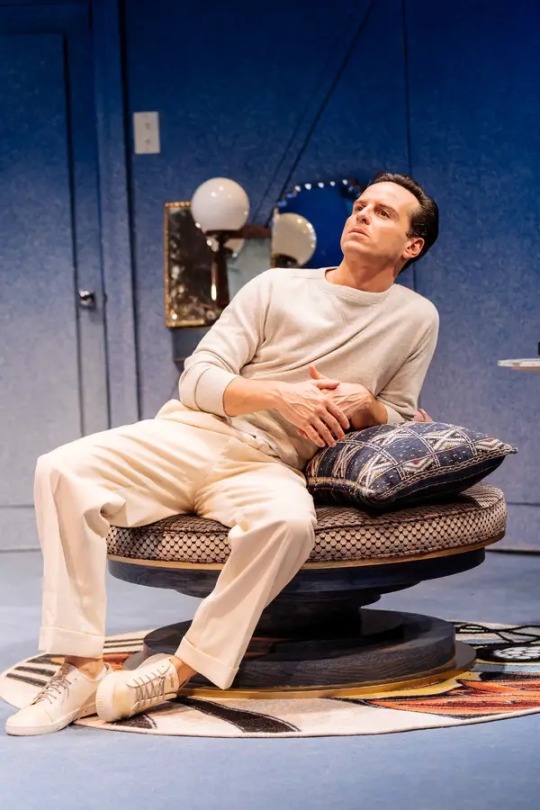#present laughter
Text

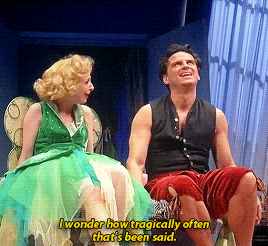




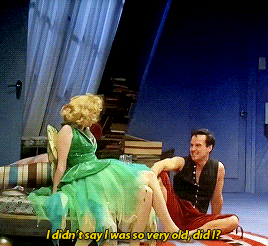

"No good can come from loving anyone like me. I'm not worthy of it - really I'm not."
#Andrew Scott#Kitty Archer#Present Laughter#(my stuff)#I could gif this whole thing but I'm not#just know every minute is incredible#never has the phrase ''bisexual disaster'' been more applicable to a character than his version of garry essendine
76 notes
·
View notes
Text
Summer is too hot and I don't know what to do with myself, so we're having an Andrew Scott (and characters played by Andrew Scott) looking cool in sunglasses megapost, just for fun and in no particular order.
Gary Essendine, Present Laughter
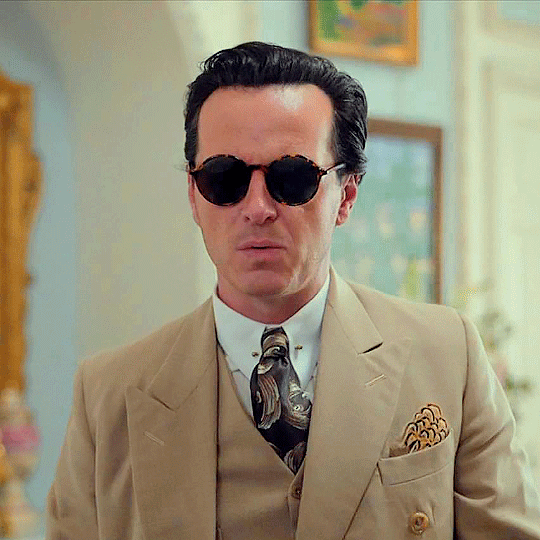
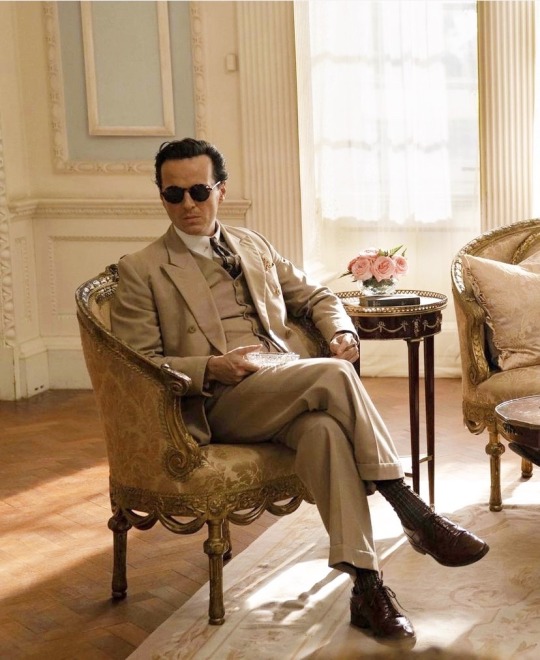
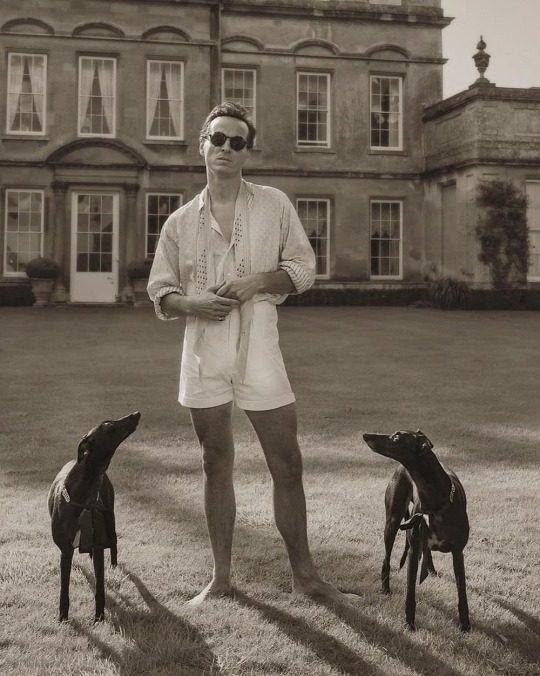
Lord Merlin, The Pursuit of Love
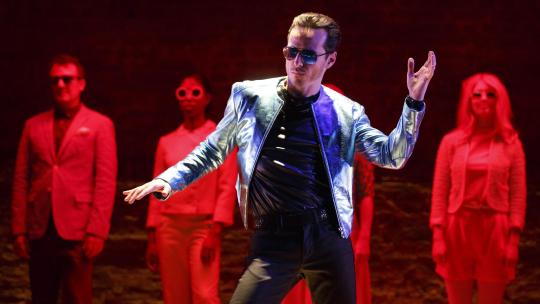
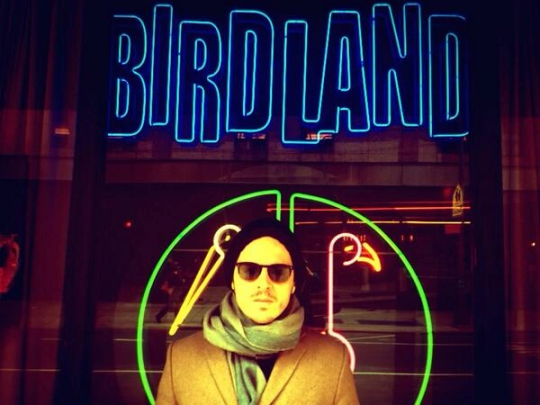
Paul ^, Andrew Scott, Birdland
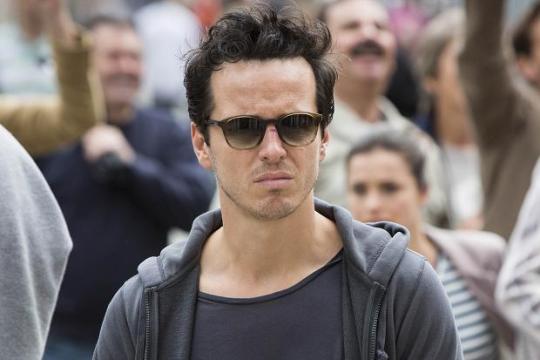

Mark Nicholas, The Town
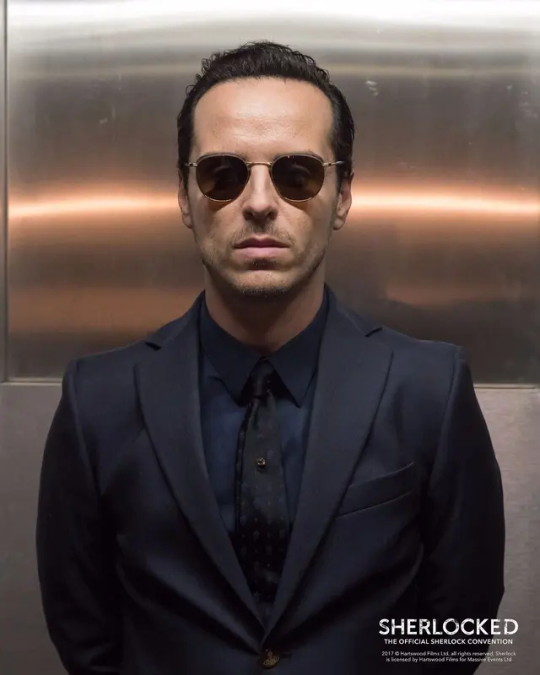

Jim Moriarty, Sherlock (obviously)
(Also they may be my favorite sunglasses he's ever worn)

Well that's all the pictures I'm allowed in one post, so maybe a part two later. (There are a lot more sunglasses pics!) BYE! 😘😎
Now with Part 2, because summer can fuck right off.
#andrew scott#garry essendine#present laughter#lord merlin#the pursuit of love#paul#birdland#mark nicholas#the town#jim moriarty#sherlock#those sunglasses are so hot#andrew scott in sunglasses appreciation post#part 1
135 notes
·
View notes
Text
'“Have you seen the sausage ad?” Andrew Scott asked me.
“No, no, we’re not going to talk about that,” Paul Mescal said.
It was a mid-November morning in Los Angeles, and I was having breakfast with two actors who have created some of the most indelible romantic leads of recent vintage: Scott, 47, played the “Hot Priest” on the second season of “Fleabag,” while the 27-year-old Mescal broke through — and broke hearts — as the conflicted jock Connell in Hulu’s “Normal People.”
Now, instead of aiming those love beams at women, they’ll point them at each other in the drama “All of Us Strangers,” due Dec. 22 in theaters. It’s like an Avengers-level team-up, if the Avengers recruited exclusively from the ranks of sad-eyed Irish heartthrobs who caused a sensation over the 2019-20 television season.
But before we could talk about their sexy, shattering new movie, Scott gently ribbed his co-star about an ad for an Irish sausage brand, Denny, that Mescal had starred in just out of drama school. (Though the rest of the world was introduced to Mescal in “Normal People,” Ireland already knew him from the ubiquitous sausage commercial.)
“Look, I needed that job in a massive way,” Mescal said. “That paid my rent for the rest of the year. But if I could take it back …”
“Ah, no, it’s lovely you have that!” Scott said. “I actually thought the character you created in the sausage ad was …”
“… career defining?” Mescal offered.
“It made me want a sausage!” Scott said a little too eagerly, causing both men to laugh. “Easy, folks, that’s too easy a joke,” Mescal said.
Scott and Mescal’s teasing, affectionate chemistry is put to excellent use in “All of Us Strangers,” directed by Andrew Haigh (“Weekend,” “45 Years”). Scott stars as Adam, a lonely writer who finds that his childhood home has become a mysterious portal that allows him to reconnect with his long-dead parents (played by Claire Foy and Jamie Bell). At the same time as Adam grapples with this past made manifestly present, he navigates an uncertain but tantalizing future with his neighbor Harry (Mescal), with whom he develops an intense romantic bond.
Over breakfast, we discussed the movie, which recently took the top prize at the British Independent Film Awards in addition to wins for directing, writing and Mescal’s supporting performance. Here are edited excerpts from our conversation.
Andrew, you were attached to this movie first. How did you feel when Paul was cast?
SCOTT I was really thrilled because I was hoping that people would be able to see how cinematic and brilliant that role is.
MESCAL It never occurred to me that people wouldn’t be interested in it.
SCOTT Well, the character is such a vessel for love. To be able to play love, it’s something that you have to just know how to embody, and Paul is so excellent about being able to allow the audience in. When I heard he was interested, I was saying to Andrew, “Make that happen!”
MESCAL Even if I didn’t like the script or Andrew Haigh as much as I do, and I knew Andrew [Scott] was going to be doing the film, I still would have done the film.
SCOTT Would you?
MESCAL A hundred percent. And I know that probably sounds sycophantic, but when I was reading it and imagining you’d do it, I thought, “This is built for an actor of your caliber.” There’s lots of brilliant dramatic actors in the world, but what I think separates Andrew is his capacity to understand the dramatic requirements of a scene but also to play utterly against it. He finds humor in subject matter like this, which is really quite heavy, and if you can make an audience laugh, you’re halfway to making them cry.
This is a very tactile movie, too.
SCOTT There’s so much touching, whether that’s familial touching or a more sensual thing. People have talked an awful lot about the chemistry and the sex between our characters, but actually what I think is really radical and affecting about the relationship is how affectionate and tender they are with each other. It’s such a beautiful thing to play, isn’t it? Just real care.
MESCAL I find it healing to watch that kind of emotional intimacy. I remember being surprised when we watched it for the first time, because I didn’t remember being so close to your face when we were talking, how we were totally taking each other in. There’s a weird thing that I don’t think you can cheat: You know how when somebody you love is talking to you, and you look at their lips? It’s like, Jesus, I can’t remember doing that.
Andrew, you’ve said before that acting is a matter of revealing. What’s being revealed about you by taking on this role?
SCOTT I think an awful lot, if I’m honest. I’m happy to be able to say that to be emancipated from shame has been genuinely the biggest achievement of my life. For a long time, I have felt very comfortable with myself, but it doesn’t take much to go back there — something a taxi driver can say can still wound you. If he might say, “You’ve got a wife?” You could go, “No, I don’t,” or is that sort of a lie by omission? I think the challenge was to undo the work and go to that place where you feel frightened.
How were you able to emancipate yourself from shame?
SCOTT I genuinely think that acting helped me. When I was a kid, I started doing elocution lessons because I had a really bad lisp. “She sells seashells,” I had to say that 17 times a day. So they sent me to elocution, which was boring, but eventually it was speech and drama classes. I was so shy and terrified, but then someone would say, “Get up and do an improvisation,” and some part of me felt …
MESCAL … free?
SCOTT Free, and I loved it. And then I practiced it a little bit more and then started doing it as a job. When I was 18 or 19, I was playing gay parts but I wasn’t out. A lot of people within the industry were queer, so I was surrounded by them and then, bit by bit, started to feel confident. To make something like [“All of Us Strangers”], it moves me, because I never thought that I’d get a chance to expose myself so much in a film like this or for it to be in such a trusting environment with such brilliant colleagues.
And do you rush headlong into the chance to expose yourself like that?
SCOTT I do. It’s my responsibility. The further I go into acting, I think that’s all it is, actually.
In the first scene you share, Paul’s character is boldly trying to flirt his way into Andrew’s apartment. Paul, it’s a kick to see you play a man so assertive and sure of what he wants.
MESCAL I was just so giddy because I don’t think I’ve got many opportunities to play somebody like that. It reminded me of characters I would have played in drama school — a lot more front-footed, a little bit bolder. Part of it was surprising an audience that might associate me with more interior, back-footed characters that I’ve played.
SCOTT I remember so clearly you saying the line, “There’s vampires at my door.” That line could seem completely preposterous and it’s a hard sell, but it’s unique, right? I’m obsessed with writing that has a real autograph about it.
MESCAL ChatGPT wouldn’t come up with that.
SCOTT Exactly. And human beings have an extraordinary way of expressing themselves. I feel the same way when people talk about big acting.
MESCAL I love big acting.
SCOTT Some people do that kind of polite, nobody-will-notice-me acting, and sometimes it can be a little dull.
MESCAL You’re looking for an opportunity to play something truthfully, but also if that truth can be a bigger, more fractious choice, maybe that could be fun.
What’s the biggest acting you’ve ever done?
SCOTT Oh my God. Pick a card, any card. I did a play called “Present Laughter” by Noël Coward, about a guy who’s an over-the-top actor. It was kind of a farce, and I’m obsessed with farce.
MESCAL I am so jealous of people who can do farce, I don’t know where I would start.
SCOTT It’s all about timing the slam of the door, and there’s no greater feeling than when you’re talking to the other actor and you are waiting for the audience to stop laughing. You’d love it because it’s so physical as well.
MESCAL I’m just a bit scared of comedy because I didn’t do a lot of it in drama school. Don’t think [I’ve got] a particularly funny disposition.
SCOTT Are you out of your mind? I’m going to have a little think now.
MESCAL I’d love to do a rom-com.
SCOTT I think you’d be very good at playing some sort of neurotic.
MESCAL Really?
SCOTT Yeah. I love those kinds of characters that don’t have a sense of humor.
MESCAL No sense of humor. Great. I can do that, I can do that easily. [Laughs.]
With “Normal People” and “Fleabag,” where you played romantic leads, how did you handle the intensity of the audience imprinting on you?
MESCAL I remember the first couple of months of that happening, I was like, “Jesus, what can I do?” And the answer is actually nothing. There’s nothing you can do about it if somebody wants to imprint or project onto you.
SCOTT That was all during the pandemic, wasn’t it?
MESCAL Yeah, yeah.
Was it better or worse that you were in your house for most of it?
MESCAL Much, much better. Even doing junkets when “Normal People” came out, I was really glad to do it within the confines of my own home. I could put the laptop down and nobody knew where I was.
Andrew, you weren’t trapped at home when “Fleabag” came out. Could you tell something had changed in the way people perceived you?
SCOTT It already happened a little bit when I did “Sherlock” [playing Moriarty] because that really does have a fandom. There were like a thousand people that would come to set, it was absolutely insane.
MESCAL Jesus.
SCOTT So “Fleabag" was completely different in that sense. It didn’t have the same frenzy.
Maybe not as you were filming it, but there was definitely a passionate fandom once it was released.
SCOTT There was, but I really enjoyed that because I love the show. I’m so proud of it and I loved that part, so I liked that it really affected people so much.
MESCAL Still! I watch it once a year.
Paul, you even dressed as the hot priest for Halloween.
MESCAL I did. That went down a bit of a storm.
When you have a breakthrough project like those two series, and you’re seen differently in this business afterward, is it hard not to get swept up by all the offers that come your way?
MESCAL I know what I like. I don’t have the confidence in myself as an actor to do something that isn’t good. I don’t think I can pull the wool over people’s eyes with bells and whistles in terms of performance, and I’m actually glad I can’t do that.
SCOTT But is it weird when you are in L.A. now? I opened up my curtains this morning, and there you are.
MESCAL Yeah, my Gucci billboard.
SCOTT That’s insane.
MESCAL It is bananas. Yeah, I’m really proud of that, but I’m also acutely aware the only reason that’s happening is because people are enjoying the work that I’m doing. It can all disappear, like that.
Paul, you’re currently working on Ridley Scott’s sequel to “Gladiator.” I’m sure you’ve been pursued for a lot of blockbusters, so what made you choose this one?
MESCAL I love the first film and I think Ridley is an all-time great, so that was a no-brainer to me. I don’t really have a desire to make lots of big films in my life, but if this was the only big film I was ever to make, I would put my name into the mix anywhere for that. I’m having a great time doing it, but I also think there’s an obligation to understand that I don’t want an audience to get bored of me, or expect me to do the big indie film every year or two, because they’re really hard to get right.
Which is hard to get right, the big film or the indie?
MESCAL A film like “All of Us Strangers” or “Aftersun.” I’ve been incredibly lucky that those scripts came across my desk because there’s lots of other indies that are really well intentioned that don’t reach an audience. Also, it’s hard to go to the emotional well year after year with stuff like this, so I don’t want an audience to get bored of my choices or expect that I’m going to do that.
SCOTT Do you remember you got the “Gladiator” call when we were on the set of “All of Us Strangers”? You were so excited. I think I was even more excited, but you were so lit up about it. I think one of the fun things about being an actor that’s open to you is that you can do whatever you really want.
MESCAL That’s what makes you tick, to go from scenes like we get to play in “All of Us Strangers” to then doing stuff where you’re running around in an arena. If I was to boil down why I love this job, it’s that you get to go to work and pretend all day long but the thing that you would imagine as a child is actually actualized.
SCOTT Have there been any moments in “Gladiator” where you’re like, “This is amazing”?
MESCAL The first day was just bananas. There was camels and thousands of extras. Two close-ups on me. A close-up on the action. And you’re just like, “I’ve got to fake this till I make it.” Wild. Wild. Wild.
SCOTT Yeah, it’s playing. It really is. You’re required to play a part, you’re not required to work a part.
It’s heartening to hear you both describe acting as play or pretend. You talk about it in such joyful terms, but some of the other leading men I’ve spoken to will …
MESCAL … fetishize the pain.
SCOTT It embarrasses them.
MESCAL It’s important to say that “pretend” doesn’t make it any less emotional or difficult to do, but I think it actually gives you a greater range of possibility in a scene. That’s not to say there weren’t days on [“All of Us Strangers”] that felt like some sort of psychological torture.
SCOTT Absolutely.
MESCAL But the act of making it? It can’t be that, because then it just becomes about “How hard can I grip this table? How much pain can I put myself through in order to talk about it to the press?”
SCOTT I think of it sometimes like you invited somebody around for dinner and you said, “I could not find any organic chicken in the market, it was an absolute nightmare. Then I had to hoover the place from top to bottom.” And they’re just like, “Give me a glass of wine. I don’t want to hear about what you did, I’m just here for dinner.”
MESCAL Yeah, that’s spot on.
SCOTT What you need to do is have the generosity to get the chicken out.
MESCAL Organic or not.'
#Andrew Scott#Paul Mescal#All of Us Strangers#Fleabag#Normal People#Gladiator 2#Hot Priest#Andrew Haigh#Weekend#45 Years#Present Laughter#Noel Coward#Moriarty#Sherlock
12 notes
·
View notes
Text
nothing makes me as unfathomably sad as knowing i will likely never see andrew scott present laughter
4 notes
·
View notes
Photo
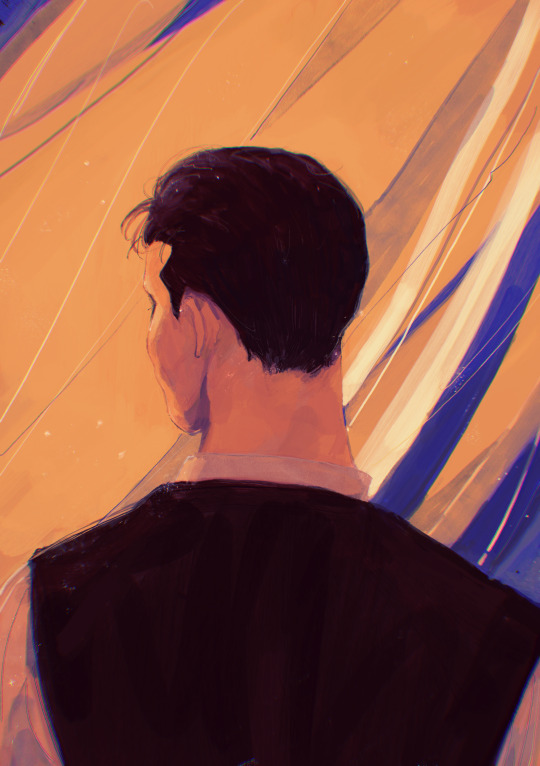

18 notes
·
View notes
Text
one of my favorite garak mannerisms is whenever someone says something to him he clearly finds completely wild and his eyes briefly widen like
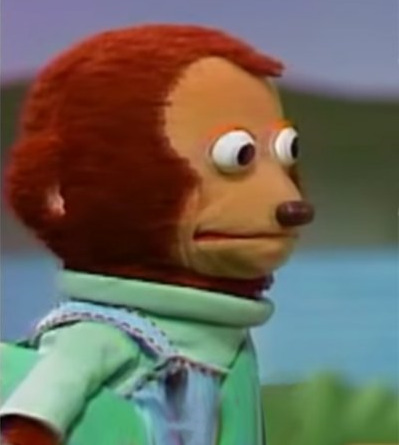
before he reacts properly. when someone tells you something SO fucking stupid that you momentarily turn into a muppet
#elim garak#star trek#star trek ds9#ds9#it's why he has to throw people off by presenting too much and conflicting information rather than pure poker face#because for all his training I'm not sure he's physically capable of controlling this reaction whenever dukat opens his mouth#the bitch reflex that cannot be tamed#it's that and the sort of unhinged laughter he'll get startled into sometimes. just. so much. makes my brain go 'fhdskjfsha'
2K notes
·
View notes
Text
IT'S BINGO ALL THE WAY DOWN, FOLKS!
153 notes
·
View notes
Text
Do not go gentle into that good night,
Old age should burn and rave at close of day;
Rage, rage against the dying of the light.
#every wise man's son doth know#what is love? t'is not hereafter#present mirth hath present laughter#dylan thomas#poetry#judaism#am yisrael chai#jumblr#jewish#jewblr#i stand with israel#antisemitism#I was ready to go gentle into that good night#to die unmarried and childless like every millennial#but the burn and rage of antisemites woke my love of day#I will rage rage against the dying of the light#now i'll marry and have as many kids as I can#and teach them to love judaism and knowledge and wisdom and life and love and kindness with all their hearts and souls#I want them to get DRUNK on the love of life and living#and learn to love jewish life as much as I#we will rage rage against the dying of the light#congratulations antisemites#you woke the love of life and living in this jew#I will make my time on earth count#and make sure there are those who will come after me#we will RAGE -- RAGE against the dying of the light
91 notes
·
View notes
Text
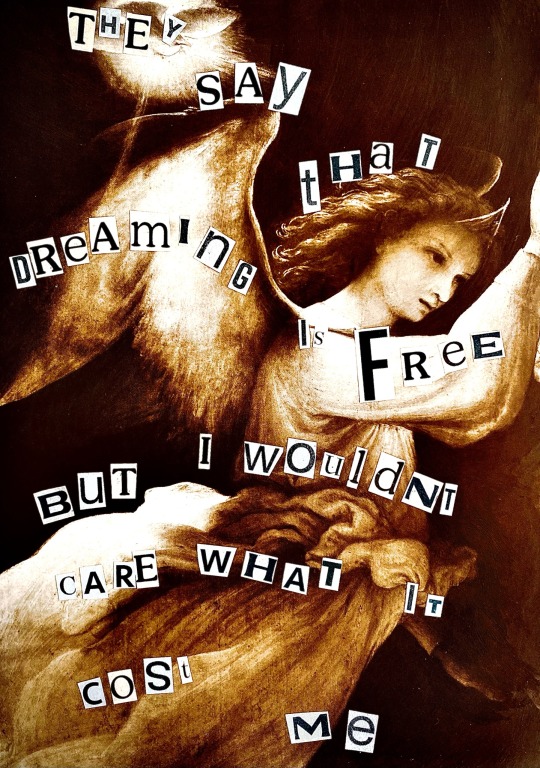
hold onto hope if you’ve got it
#late birthday present for diana midnightcitv <3#lyrics are from paramore’s 26!#art#my art#words#angels#<3#collage#collage art#journaling#journal#journal art#lyrics#lyric art#paramore#after laughter#hayley williams#midnightcitv
711 notes
·
View notes
Note
Do you think Vox would be a swallower or a spitter?
HAHAHHAHAHADHHDHS ANON 😭
NSFW obv
Probably a spitter ngl.
If you somehow actually managed to get him to the point where he sucked you off he'd probably be incredibly picky about it.
Swallowing would probably read as too submissive to him or some fuckshit like that.
I can see him straight up being pissed you came in his mouth - especially if you didn't give him a warning beforehand.
Cumming on his face would be WORSE tho lmao. Like the hit to the ego that would be for him would be WILD. The bitching would not end about that 😭
You'd probably need to set up a towel or something because if you came on him in any way, he'd probably be really pissy about it ngl. You could not win.
#PLS this made me yell with laughter when i read it#me happy to get questions about AMAB reader tho#vox headcanons#vox x reader#hazbin hotel vox#also sorry about the lack of content my writing brain has NOT been present. fear i am probably burnt out atp so L
36 notes
·
View notes
Text
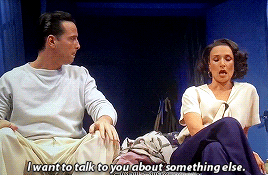
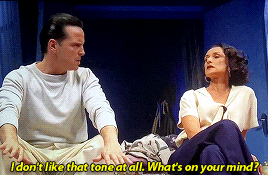


"Don't you think it's time you started to relax?"
"What on Earth are you talking about?!"
53 notes
·
View notes
Text

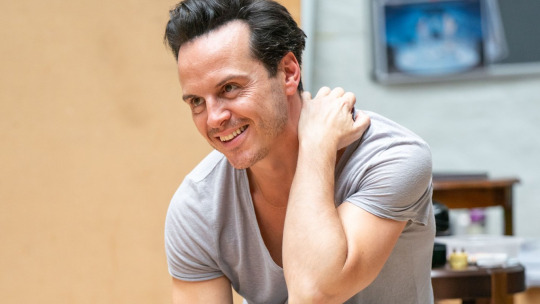

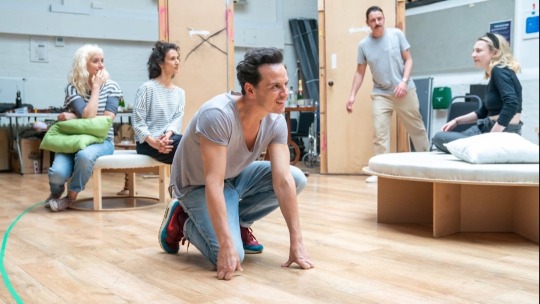
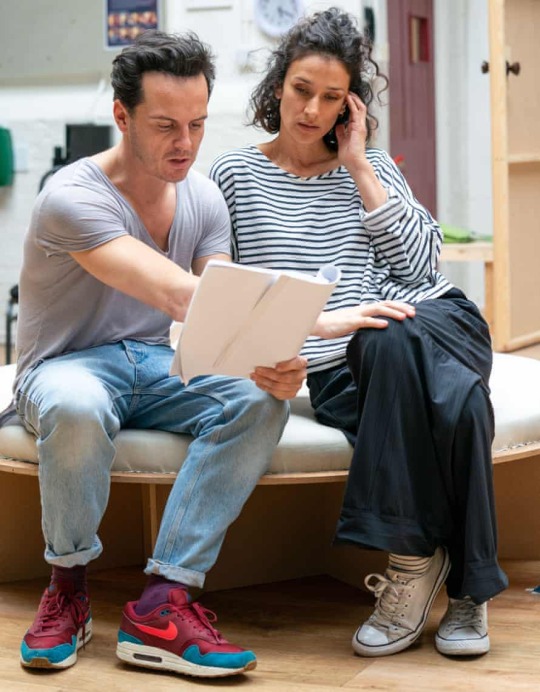
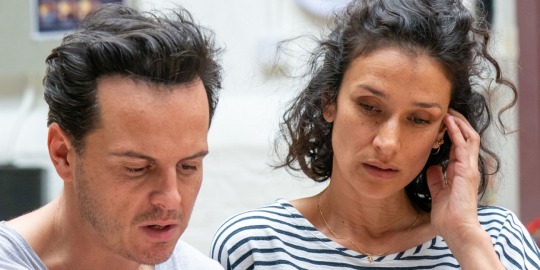

Rehearsal photos from Matthew Warchus' 2019 production of Noel Coward's Present Laughter starring Andrew Scott.
#andrew scott#present laughter#noel coward#matthew warchus#indira varma#kitty archer#enzo cilenti#sophie thompson#theatre
72 notes
·
View notes
Text
'Fleabag’s hot priest is about to take on his most liberating role yet: a one-man show of Chekhov’s Uncle Vanya in which he will play all nine roles, male and female. He loves taking risks, he says. It seems to be paying off…
I last saw Andrew Scott in the flesh eight years ago. I was sitting in the gloom at the top of what used to be St Martin’s School of Art in the Charing Cross Road – a tiny, temporary theatre had sprung up there – and he was three feet away from me, surrounded by great piles of stuff: newspapers, books, chairs, cupboards… a piano. The occasion was Richard Greenberg’s play The Dazzle, about two compulsive hoarders, the Collyer brothers, and his performance as one of them was mesmerising: in truth, almost too mesmerising. My mind went into overdrive. All that paper and mahogany. What if something toppled, and he was crushed – as the real Langley Collyer was – beneath a chest of drawers?
He wasn’t crushed, of course. But what’s striking and slightly odd is that today I’m seeing Scott in the flesh for the second time, and we’re again at the top of an old building – in this case, a public library – in rooms that feel a bit dilapidated, if not exactly derelict. People imagine the actor’s life to be a glamorous one, particularly if the actor in question has been in a Bond film – and of course it has its enchantments. But then there are the hours spent in spaces like this: long days of sandwiches, bottled water and elusive lines. When we came up in the ancient lift together, I couldn’t decide which of us was the more anxious. He was, I would guess. “MY TWELVE HOURS TRAPPED WITH FLEABAG STAR” ran the ticker tape in my mind as the mechanism creaked and groaned, and we each did our best not to meet the other’s eye.
Scott has spent the past three weeks here, deep in rehearsals for Vanya, a new version by Simon Stephens of Anton Chekhov’s great tragicomedy Uncle Vanya. But there’s new, and then there is… new. This adaptation gives the play, among other things, a contemporary setting. However, when the production opens in the West End, its chief novelty – and its chief draw, given Scott’s huge following – will be the fact that it is a one-man show. He will be playing all nine parts: male and female, young and old, beautiful and not-so-beautiful. It must be hard to learn so many lines, I say, once he’s (semi) comfortable on a battered leather sofa, his old, white T-shirt giving him a slight look of Marlon Brando. Doesn’t he feel like he’s going mad, with all these voices in his head? He laughs – a high-pitched, wicked laugh. “Yeah. I do, and it’s really hard [to learn]. Usually, when you can’t remember a line, another actor will say, ‘What time is it?’ or something, and then it comes to you. But now I’ve no one to cue me.” Alone on stage, he has had to change his mindset completely: “I’ve come to understand that I’m sort of looking after all these characters.”
The idea for a one-man production came about by accident. Scott, Stephens, and Sam Yates, who is directing the play, were workshopping it together (Scott has worked with Stephens twice before, most notably in Birdland at the Royal Court, in which he played a rock star who has made a Faustian pact with fame). “We miscalculated the parts, and I ended up having to act with myself, and it was kind of interesting. It gave birth to the idea that, as much as these characters say they’re different from each other, actually, some of them are very similar. I’m more interested now in those similarities than in, you know, doing a funny voice [for each one]. The production seems to me to be about what the act of creation is. I love the idea that you might be able to represent what a writer experiences on stage, all these characters in his head.”
But how on earth will the audience work out what’s going on? I understand about the funny voices, but won’t Scott have to change his a little bit when he’s acting the part of a woman? He smiles, teasingly. “I don’t think I should tell you that… But you don’t need to worry too much. I feel so liberated! I hope people will start to look at what’s within the performer so that something happens that can only really take place in a theatre – which is that you’re seeing one thing, but imagining something else.” This sounds like reading a novel, visualising scenes and characters for yourself, filling the gaps between words. He nods. “Look, I definitely don’t want to shy away from the ridiculousness of this project, and yeah, I’m nervous, but I’m loving the process. I think it’s a really sexy play. You know, Chekhov was a doctor, and he saw death so much, and I think he was able to understand human beings like no other writer.”
The argument that actors should only play who they are – that a gay character, for instance, may be played only by a gay actor – is made more and more often lately. But this production seems (to me, at least) subtly to resist the notion of identity politics in the theatre; to suggest that such rigidity may sometimes be a cul-de-sac. “It can be a cul-de-sac, certainly,” Scott says. “Of course those arguments have to be heard. The world isn’t a level playing field. But I think transformation is as important as representation. Our first understanding of storytelling happens when we’re young. Our mother or father is pretending to be a wolf. We know we’re safe, but we’re scared, too. Our parent can be a wolf! Human beings can create worlds within themselves. I don’t think we can just slice that out of ourselves.”
He knows some will heartily dislike this Vanya, but the thought seems, if anything, to excite him. “It could go wrong,” he says. “But we need a bit more of people not liking things.” He’s ambivalent, to put it mildly, about standing ovations, which seem to happen in the theatre most evenings nowadays. “My concern is that everything becomes meaningless. I think it’s unfortunate that if someone decides not to stand up, it’s perceived that they hated it. That’s not necessarily true. Maybe I thought it was very good, but I didn’t feel like rising to my feet. My producers are going to hate me for saying this, but I strongly believe that if people don’t feel like standing up, they shouldn’t. People feel lonely, having to stand when they don’t want to. Equally, it’s kind of moving when most people are not standing up, and three people are.”
Does he blame the internet for this? Is it just another form of “liking” something? “I do blame the internet, yes.” But perhaps, too, it has to do with cost. “I was recently on Broadway, and tickets there are astronomically expensive, and I thought: well, these people have to stand up because they’ve spent $390, so it’s got to have been one of the best nights of their lives.” Either way, he doesn’t understand it: the firmness and immediacy of people’s responses. “When you’ve just seen a play, it’s a really sensitive time. It’s weird when people start talking straight away about their new conservatory.” All this may explain why he feels there is more value for him in doing experimental work. “Some people will like it, some people won’t, and that’s great. I feel ferocious about wanting to take risks.”
In the coming months, Scott will be everywhere: a trick of scheduling, rather than by design. Vanya will be followed in January by the release of All of Us Strangers, a film in which he stars with Paul Mescal and Claire Foy (he plays a depressed screenwriter who goes to visit his childhood home, only to find that his parents, far from having died in a car crash when he was 12, are alive and well – though much of the coverage of the movie so far has focused on the fact that his character and Mescal’s are lovers). “It’s a beautiful film,” he says, dreamily. And then there’s Ripley, a Netflix series (its release is expected at the end of this year), based on Patricia Highsmith’s novel The Talented Mr Ripley, written and directed by Steven Zaillian, the screenwriter of Schindler’s List and Hannibal.
“It’s a big, big thing,” he says, of his role as Tom Ripley, grifter and serial killer. And yet, Scott said he wouldn’t be doing any more crazed sociopaths, having played Moriarty in Sherlock (he was also a baddie in the Bond film Spectre). “I know, but what I find interesting about him is not the psycho-ness; it’s the otherness. To me, it’s about what it’s like never to be invited to the party. We all know people who don’t make it easy for themselves, who are maybe a bit strange. But if you’re constantly ignored, or sidelined, or don’t fit in, what happens? Is it that something dark emerges? I don’t mind saying that playing him was challenging. It was very lonely. We filmed during Covid, and the five-day isolation requirements that were in place both here and in Italy meant people couldn’t come and visit, and I couldn’t come home. It’s eight hours of television, and he’s a solitary figure in this version, so I was on my own a lot.”
Scott is 46, though you wouldn’t know it; his enthusiasm, like his fidgetiness, belong to a younger man. He grew up in Dublin, with his two sisters – his father worked at an employment agency; his mother was an art teacher – where he was educated at private Jesuit school, attending drama classes on Saturdays. Art was his first plan – painting is still his great love; he can’t wait for the forthcoming Hockney show at the National Portrait Gallery – and he won a bursary to art school at 17. But then he was cast in a film, Korea, about an Irish boy emigrating to America in the 1950s who’s enlisted to fight in the Korean war, so he turned the place down, and once the movie was done, went to Trinity College to study drama instead. After six months, bored by the course, he left to join Dublin’s Abbey theatre.
He seems hardly ever to have been out of work, and his CV is such a mixture: Gethin the tense gay Welshman in Matthew Warchus’s film Pride; eccentric Lord Merlin in the BBC adaptation of The Pursuit of Love; an acclaimed Hamlet in 2017 at the Almeida theatre. By this point, his mantlepiece – he has two, one in London, and one in Dublin – must be quite frantic with statuettes (his most recent win, in 2020, was a Laurence Olivier award for best actor for his performance as Garry Essendine in Noël Coward’s Present Laughter). Does he feel blessed? “Yes, and that’s a really nice way of putting it. I’m grateful.” But perhaps this sounds too… humble: “I’ve never understood why there’s some sort of shame associated with being an artist. I feel able to call myself one.”
His fame is at a level that means he can move around London unnoticed, and he’d like to keep it that way. “I’m suspicious of it. I’ve no real interest in the value of it. The idea of being followed by a photographer seems hellish to me.” Does it affect his relationships? He doesn’t believe that it does, though there are “creepy, unsavoury people” out there who might not “have my best interests at heart”. Is he single? “Yes, I am.” Would he like to meet someone? He would. Surely it’s easy in his world? So many lovely new people entering his orbit all the time – and with his looks… He laughs. “That’s a lot of projection, there,” he says, sounding suddenly more Irish.
I read somewhere that some women in Ireland will always think of him as the guy who turned up to their demonstrations in the run-up to the abortion referendum in 2018, even when it was raining (the vote overturned the ban on abortion in the country, and followed one of 2015, which allowed same sex couples to marry). Isn’t it amazing how much Ireland has changed? When he was 16, it was still illegal to be gay, as he is. “Yes, it’s immense for people of my generation to have been emancipated from the shame of the Catholic church. But it’s interesting. Privacy matters to me, but then I remember Sinéad O’Connor being on The Late, Late Show, talking about human rights, and how important that was. Her kindness… We’re only just finding out about it. She didn’t announce it to the world. Again, it brings us back to social media. Does kindness happen if you don’t tell everybody about it?”
Scott is no longer a practising Catholic. But he can’t be certain this means he won’t call for the priest at the end (this conversation has taken a morbid turn, and it’s my fault). Perhaps it’s in the marrow. “It’s the organisation that’s the problem, not the principles behind it, which are very beautiful for the most part. I remember when Simon and I were doing [the play] Sea Wall. One of the lines in it is: show me God, where is he? And then the next line is: well, show me love, where is that? You can’t get evidence for either of them really. They’re just strong feelings. I believe in the power of love. I feel it’s stronger than anything, because you can’t do anything about it. I’ve so much of it in my life, and one of the things I’m most proud of is how much I’m able, not only to receive it, but to give it – and if somebody thinks that’s sentimental or mawkish, well, to me it’s the opposite.” He talks for a while in this vein. “I want to try to be a good person; not just a nice person, but a good person,” he says, his voice racing on – and it makes me think of him as the Hot Priest in Phoebe Waller-Bridge’s Fleabag, the role for which he may now be best known. If every pulpit came with an Andrew Scott, our churches would be bulging at the seams.
Soon after this, there’s a knock on the door. It’s time to begin rehearsal (in the hall outside, his director stands at a lectern, looking quite priestly himself). He has, he says, another three weeks to go before Vanya opens, and when it does, he’ll be looking out for me; I’d better be sitting down at the curtain call, he jokes. Well, perhaps I’ll have good reason to be sitting down, I joke back. But he’s ever serious: “I always remember what my mum used to say. She’s an art teacher, and she used to tell us that a good drawer never rubs out. So, you draw a line, and then you get it wrong, and then you start a new line. The fact that people can see your old line doesn’t make them appreciate your new line any less. It may even make them appreciate it more.” What he means, I think, is that he believes it’ll be all right on the night.'
#Andrew Scott#Fleabag#Vanya#Ripley#The Dazzle#Anton Chekhov#Uncle Vanya#Simon Stephens#Sam Yates#Birdland#All of Us Strangers#Paul Mescal#Claire Foy#Jamie Bell#The Talented Mr Ripley#Patricia Highsmith#Steven Zaillian#Moriarty#Sherlock#Spectre#Pride#Lord Merlin#The Pursuit of Love#Hamlet#Almeida Theatre#Noel Coward#Present Laughter#Olivier Awards#Sea Wall#Phoebe Waller-Bridge
18 notes
·
View notes
Text
Two books, two quick little lines which whenever I think about I become hysterical


#posting on main#I’ll rb to my side#but oh my GOD#the carnivorous flamingo line!!#it lives rent free in my head#right next to ‘Jack you have debauched my sloth.’#whenever I think about them! I get stitches I just start crying with laughter#I say they’re different and they are but there is SOMETHING in the Aubreyad books that’s so present in pTerry’s books#I don’t know what it is it’s like distant cousins or something#anyways this is slightly niche and not really the point of this blog#I mean. I post boats and history and Aubreyad stuff on here but my side blog is all discworld and books and films and fandom bs#nobody who sees this will care but it makes me laugh so I put them up side by side#favourite lines ever in modern western literature#and I am BARELY joking#discworld#men at arms#sam vimes#havelock vetinari#aubreyad#stephen maturin#jack aubrey#aubrey maturin#hms surprise#gnu terry pratchett#it’s just hit me - and this is so cursed but! I’ve made my cake and now I must lie in it#Jack and Ridcully - same energy#I’m already destroying my credibility here so I can’t really explain it! but you see it right??#come ON#yep I’m so sorry
165 notes
·
View notes
Text
i just did an interview for something really important and i think it was hot garbage and im so scared . ive been looking forward to this for . 2 years now . fuck my life .
my mind is pliable rn so im going to fake myself into thinking it was all really good
#rant#arhg#scared and filled with anxiety#okay here are my POSITIVE THOUGHTS.#evberything goes my way and nothing can go wrong in life#i have worked so hard and put in so much effort#the universe will grant me the best option#i infuse the world with so much joy and laughter#the jury loves me and will be nice to me#i did NOT fumble the interview. i did so well and i presented myself clearly#my camera and mic not working did NOT set me back 1082939 paces#it did NOT make me panic and worry for my life and sanity#i am so knowledgable of the topics and they are so happy they allowed me to do the interview
7 notes
·
View notes
